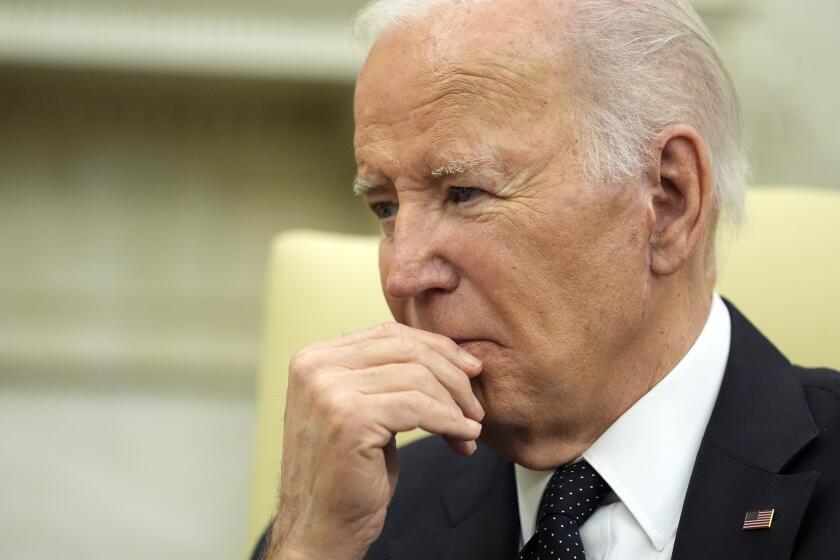Recession Burdens Tory Campaigns : Britain: As hard times hit once-affluent communities, the Conservative Party fights to hang on to its majority in Parliament.
In this handsome, 18th-Century spa city, with its rows of honey-colored stone houses, the economic recession has bitten deeply, a factor that may determine the outcome of the national election campaign.
Affluent Bath and other southern England communities that stretch along a light industrial corridor eastward to London prospered during Margaret Thatcher’s years of Conservative government.
Because of this, current hard times have come as a greater shock here than in the country’s northern rust belt. And so-called marginal Conservative parliamentary seats--those whose holders won last time by slender margins--are being hotly contested in the campaign for April 9 elections to renew the House of Commons.
Bath itself is such a constituency, and its member of Parliament, Christopher Patten, is running scared.
In a recent interview at Conservative headquarters here, Patten, who is also the Tory party’s national chairman, said: “Obviously, coming off the back of the recession makes it a more difficult fight. Bath and other areas in the south enjoyed spectacular growth under the Conservatives, and that makes the recession more difficult. But I think we are seeing the first signs of recovery--and that will help us.”
By every account, Britain is going through its most severe recession since World War II, with all geographical regions hard hit, even those that managed to scrape through previous economic downturns unscathed.
In Bath, as in Bristol, Swindon, Reading, Slough and London itself, stores are empty of customers, and middle-class workers have found themselves out of work, with business bankruptcies at a new high.
National unemployment is running at 9.2%, with about 2.6 million people out of work. And some experts predict that joblessness may rise to rival postwar highs at 3 million, or 10%, before recovery sets in.
Like the Ronald Reagan years in America, former Prime Minister Thatcher’s period of leadership in Britain (1979 to 1990) was one of expanding credit, the launching of new businesses and easy home mortgages. The government sold public housing to tenants, often working-class people who thereupon became Tory voters.
But as the recession set in, reflecting a worldwide economic slump, interest rates rose, spending declined, and nearly everyone suffered economically, all under the Tories.
While the Conservatives call attention to the number of new businesses formed during the Thatcher era, the recession dampened the free enterprise period. Last year, for instance, 75,540 homes were repossessed, and 47,777 firms went out of business.
Those facts have been pounded home by the opposition Labor Party’s campaign, which charges Conservative leaders with mismanaging the economy and calls for its replacement by a Labor majority in Parliament.
“Just as in the United States,” one economic expert said, “the British vote their pocketbooks.”
The Tories warn that if a Labor government comes to power, public spending will increase, inflation will rise, and business confidence will suffer, leading to a prolonged recession.
Similarly, business and finance leaders argue that a hung Parliament--in which neither of the two major parties holds a clear majority--could kill hopes of an early economic recovery.
But economics commentator Anatole Kaletsky said about a possible Labor victory: “If Labor’s (candidate for prime minister) Neil Kinnock managed to navigate successfully through the next year or two, economic recovery would eventually gather pace and Labor could start to look like a natural party of government.”
As election day nears, political party strategists say they are targeting the crucial marginal seats, those of either party held by thin majorities.
Often such constituencies have upwardly mobile voters, people with working-class roots but middle-class lifestyles who have moved from cities to suburbs and, in the process, shifted their vote from Labor to Tory.
And though these voters have gone Conservative in recent elections, they are currently disillusioned; they fear unemployment and, while they would like to see improvement in such welfare services as national public health, they do not welcome higher taxes.
Tories such as Patten here in Bath emphasize that despite the recession, the Conservatives are still far more expert at managing the economy than Labor, a theme central to Tory campaigning as election day approaches.
However, the opposite line--here and nationally--is pushed by the Labor candidate in Bath, Pam Richards, a tall, dynamic city councilor, who took a moment away from stuffing election envelopes in her office to warn against voting for the third-party Liberal Democrats.
“Look around Bath,” she said. “Businesses are closed. Shops are vacant. The industrial base is eroded. White-collar and professional people are unemployed. We were fairly prosperous here. But the recession has cut deeply and the government has done nothing.
“Unlike the Lib Dems, we, the Labor Party, are in a position to do something about it.”
More to Read
Start your day right
Sign up for Essential California for news, features and recommendations from the L.A. Times and beyond in your inbox six days a week.
You may occasionally receive promotional content from the Los Angeles Times.






